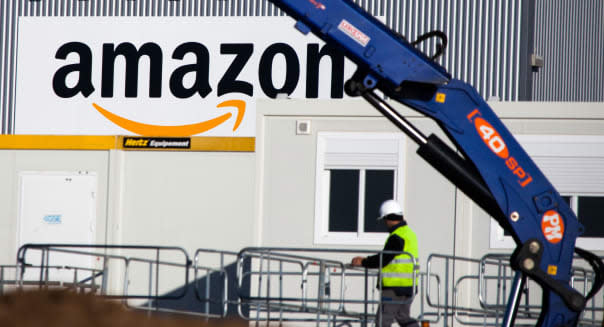Sector Rotation: Why Tech Stocks Are Losing Their Cool

Last week was another brutal showing for Internet stocks. As the Dow and S&P 500 rose to new all-time highs, the tech-heavy Nasdaq Composite closed lower on the week. Technology stocks have historically outperformed blue chip investments, but we've seen the Dow get the upper hand in each of the past few weeks. And the Nasdaq got pummeled again on Monday.
Nasdaq's 0.7 percent slide on the week wasn't pretty, but several of the former market darlings suffered even harder hits.
LinkedIn (LNKD) -- the social networking hub for career-minded professionals -- saw its stock drop 13 percent last week. Restaurant reviews hotbed Yelp (YELP) plunged 14 percent. HomeAway (AWAY) has become the online destination for folks looking to book vacation property rentals, but bulls were the ones on holiday as the stock shed 10 percent of its value.
Recent market debutantes also got roughed up. Care.com (CRCM) -- a site that aims to match nannies, tutors, maids and senior-care pros with families that need them -- saw its stock drop 16 percent last week. Online deals provider Coupons.com (COUP) tumbled 19 percent.
There weren't too many tech winners lately, making this a classic case of sector rotation.
As the Roulette Wheel Turns
Seasoned investors know that industries never move in lockstep with the markets. Some sectors slide during rallies. Some sectors ascend during selloffs. Sector rotation is historically hard on the newbies. Care.com and Coupons.com know that now. LinkedIn, Yelp, and HomeAway -- all public companies for less than three years -- are young to the market and working their way through the proverbial Terrible Twos.
However, many of the Internet's flagship stocks are also feeling the pain. Leading online retailer Amazon.com (AMZN) has slipped 19 percent in 2014. Video streaming giant Netflix (NFLX) was last year's biggest winner among stocks in the S&P 500, but the stock has slipped 26 percent since peaking at $458 last month.
Both of these companies have been trading publicly since the Internet was in its infancy, and clearly they are susceptible to the curse of investors selling off one set of stocks to buy into another.
Investors unloading technology stocks after five years of stellar gains isn't really a surprise. The challenge here will be to know when it's time to buy back in.
Betting on a Bounce
An index or stock is considered to be in a bear market when it relinquishes at least 20 percent of its value. By that metric we saw Amazon, Netflix, and even Facebook (FB) enter bear territory corrections in recent trading days.
Opportunistic investors will be tempted to buy into these selloffs. The fundamentals for Amazon, Netflix and Facebook have never been stronger. They are all growing quickly as category leaders with no challengers threatening their reigns at the top of e-tail, streaming video and social networking.
%VIRTUAL-article-sponsoredlinks%However, it's not as if a 20 percent decline is a dinner bell. Amazon, Netflix, and Facebook should bounce back, but we don't know how far they will drop before they begin the redemptive path of upticks. Longtime investors know this. Facebook went public two years ago at $38, and just a few months later it was trading in the teens. Netflix saw its stock go from $305 three summers ago to the single digits just a few months later.
Amazon has held up pretty well in recent years, but it was one of the biggest victims of the dot-com bubble. It gave up more than 90 percent of its value between its bubble peak of 1999 and when it bottomed out two years later.
Bulls will be quick to argue that all three companies went on to overcome their swoons. Amazon hit a new all-time high in January. Facebook and Netflix followed two months later. As long as their competitive positions remain intact and growth continues, it wouldn't be a surprise to see all three companies overcome their declines of 20 percent or more. It could happen later this year, but it could also happen in several years.
That's the rub. The stocks can also continue to head substantially lower, as we've seen with all three companies at least once in the past.
Patient investors can always consider buying in now, but more nimble traders will want to wait until the sector rotation plays itself out with tech stocks coming back in fashion.
Motley Fool contributor Rick Munarriz owns shares of Netflix. The Motley Fool recommends Amazon.com, Facebook, HomeAway, LinkedIn, Netflix and Yelp. The Motley Fool owns shares of Amazon.com, Facebook, LinkedIn and Netflix. Try any Motley Fool newsletter services free for 30 days.

